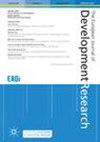Criminal Accountability for Actors and Legal Protection for Online Cat Calling Criminal Victims
IF 2.6
3区 社会学
Q2 DEVELOPMENT STUDIES
引用次数: 0
Abstract
The crime of sexual harassment is divided into 2 (two), namely verbal harassment and non-verbal harassment. One form of verbal sexual harassment is known as Cat Calling, which means harassment in a public space by giving obscene words related to sexuality where many of the victims are women. The increase in online internet-based technology and information has made cat calling sexual harassment common in the form of comments, photos and videos circulating on online social media. Criminal law in Indonesia which contains acts that can be categorized as sexual harassment is generally regulated in the Criminal Code (KUHP) with the addition of Law Number 19 of 2016 concerning Amendments to Law Number 11 of 2008 concerning Information and Transactions Electronically (UU ITE) when done online. Most recently, sexual harassment or sexual violence or sexual violence is regulated in Law Number 12 of 2022 concerning Crimes of Sexual Violence. Cat Calling perpetrators can be held criminally responsible in accordance with applicable laws and regulations accompanied by strict sanctions in an effort to prevent and eradicate criminal acts of online Cat Calling sexual harassment and legal protection for victims of Cat Calling online is absolutely necessary to repair the trauma experienced by victims行为人的刑事问责与网络呼猫犯罪受害者的法律保护
性骚扰罪分为2(二)种,即言语骚扰和非言语骚扰。言语性骚扰的一种形式被称为Cat Calling,这是指在公共场所用与性有关的淫秽言语进行骚扰,其中许多受害者是女性。网络技术和信息的增加使得喵星人性骚扰以评论、照片和视频的形式在网络社交媒体上传播变得普遍。印度尼西亚的刑法包含可归类为性骚扰的行为,一般在刑法(KUHP)中进行规定,并增加了2016年第19号法律,该法律涉及对2008年第11号法律的修正,该法律涉及在线进行的电子信息和交易(UU ITE)。最近,关于性暴力犯罪的2022年第12号法律对性骚扰或性暴力或性暴力进行了规定。为了防止和根除网络“叫猫”性骚扰的犯罪行为,对“叫猫”的肇事者依法追究刑事责任,并给予严厉的制裁。对网络“叫猫”的受害者进行法律保护,对于修复受害者所经历的创伤是绝对必要的
本文章由计算机程序翻译,如有差异,请以英文原文为准。
求助全文
约1分钟内获得全文
求助全文
来源期刊

European Journal of Development Research
DEVELOPMENT STUDIES-
CiteScore
5.70
自引率
4.00%
发文量
77
期刊介绍:
The European Journal of Development Research (EJDR) redefines and modernises what international development is, recognising the many schools of thought on what human development constitutes. It encourages debate between competing approaches to understanding global development and international social development. The journal is multidisciplinary and welcomes papers that are rooted in any mixture of fields including (but not limited to): development studies, international studies, social policy, sociology, politics, economics, anthropology, education, sustainability, business and management. EJDR explicitly links with development studies, being hosted by European Association of Development Institutes (EADI) and its various initiatives.
As a double-blind peer-reviewed academic journal, we particularly welcome submissions that improve our conceptual understanding of international development processes, or submissions that propose policy and developmental tools by analysing empirical evidence, whether qualitative, quantitative, mixed methods or anecdotal (data use in the journal ranges broadly from narratives and transcripts, through ethnographic and mixed data, to quantitative and survey data). The research methods used in the journal''s articles make explicit the importance of empirical data and the critical interpretation of findings. Authors can use a mixture of theory and data analysis to expand the possibilities for global development.
Submissions must be well-grounded in theory and must also indicate how their findings are relevant to development practitioners in the field and/or policy makers. The journal encourages papers which embody the highest quality standards, and which use an innovative approach. We urge authors who contemplate submitting their work to the EJDR to respond to research already published in this journal, as well as complementary journals and books. We take special efforts to include global voices, and notably voices from the global South. Queries about potential submissions to EJDR can be directed to the Editors.
EJDR understands development to be an ongoing process that affects all communities, societies, states and regions: We therefore do not have a geographical bias, but wherever possible prospective authors should seek to highlight how their study has relevance to researchers and practitioners studying development in different environments. Although many of the papers we publish examine the challenges for developing countries, we recognize that there are important lessons to be derived from the experiences of regions in the developed world.
The EJDR is print-published 6 times a year, in a mix of regular and special theme issues; accepted papers are published on an ongoing basis online. We accept submissions in English and French.
 求助内容:
求助内容: 应助结果提醒方式:
应助结果提醒方式:


